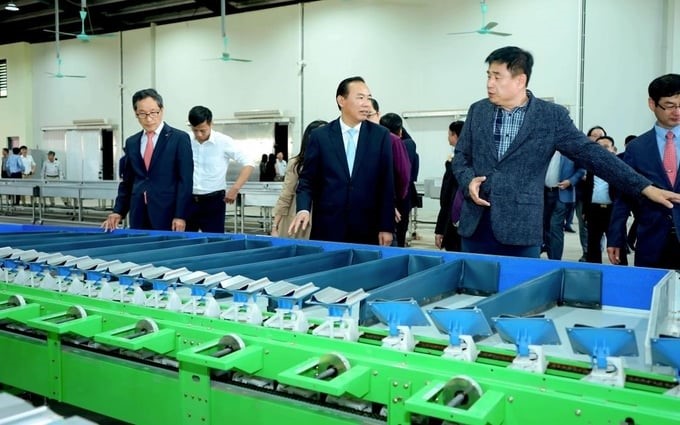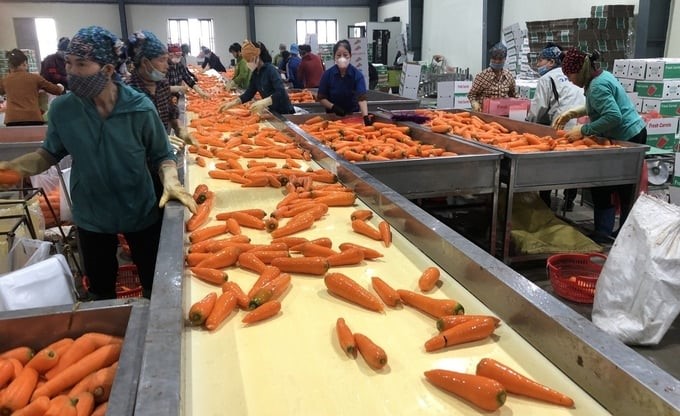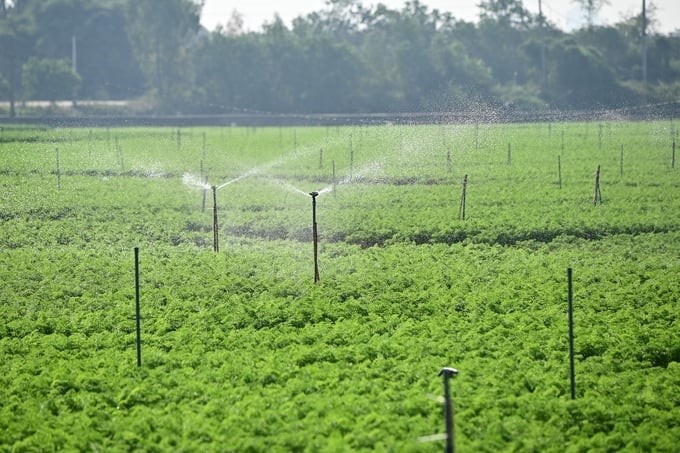May 21, 2025 | 03:03 GMT +7
May 21, 2025 | 03:03 GMT +7
Hotline: 0913.378.918
May 21, 2025 | 03:03 GMT +7
Hotline: 0913.378.918
Until now, Mr. Nguyen Duc Thuat, Director of Duc Chinh Agricultural Service Cooperative (Cam Giang district, Hai Duong province), has not forgotten the joy of a previous year. Thanks to the Project "Supporting agricultural product processing and preservation facilities in Vietnam," sponsored by the South Korean Government and the Vietnam Academy of Agricultural Sciences as the investor, his cooperative was built with a new factory with a scale of nearly 1,000 m2. Among them are an automatic washing line, a sorting machine with a capacity of 25 tons/day, and a low-temperature storage warehouse with a width of nearly 50 m2.

Deputy Minister of Agriculture and Rural Development Phung Duc Tien (middle) visits the carrot pre-processing line of Duc Chinh Agricultural Service Cooperative. Photo: VAAS.
Duc Chinh is the carrot capital of Hai Duong province, with an annual farming area of over 300 hectares. Before there was a modern pre-processing line at Duc Chinh Cooperative, farmers mostly had to do it manually, causing the fear of product congestion at each harvest period. However, right in the first year of operating the new factory, the cooperative promoted purchasing and pre-processing carrots for people. On some peak days, the cooperative pre-processed and exported up to 100 tons of carrots/day to South Korea.
The application of modern machinery and equipment in pre-processing and preserving carrots has been contributing to increasing labor productivity, adding value to Hai Duong vegetables, and significantly improving farmers’ income. In addition, thanks to the advice of South Korean experts, the province's winter crops met strict quality requirements while also opening up opportunities for directly exporting to many other countries, such as Malaysia, the UAE, etc.
According to Director Thuat, companies contact the cooperative and negotiate prices directly, so people are not squeezed on prices due to eliminating the intermediary stage. "Improving quality and meeting requirements to export to foreign markets has brought great joy and income to us," he said.
To export carrots to high-end markets, the post-harvest stage is very important. Carrots must be washed five times with water and refrigerated at - 3oC for about 16–24 hours. During the pre-processing process, workers must fully implement food hygiene and safety measures.

Ms. Nguyen Thi Hanh, Secretary of the Duc Chinh Commune Party Committee (middle), visits the commune's carrot field. Photo: Tung Dinh.
With numerous orders from abroad, the Hai Duong Provincial People’s Committee paid attention to investing in expanding the main road of the carrot field from 3m to 6m for convenient transportation. In addition, a water-saving irrigation system (spray irrigation) getting water from the Thai Binh River was installed for about 100 hectares of carrots outside the dike.
Ms. Dang Thi Xim, a farmer household in Duc Chinh commune, said that growing carrots now no longer pays much attention to the root’s big or small size but to whether the residue of pesticides and fertilizers in the roots is guaranteed to meet the standards and quality of importing markets or not.
Focusing on improving quality, over the past few years, Hai Duong has almost kept the winter crop area stable at about 21,000 hectares. Total output is estimated at nearly 500,000 tons. The production value of this winter crop reaches about VND 5,000 billion, an average of more than VND 200 million/ha.
Crop areas with low economic efficiency are gradually converted to staple crops with high economic efficiency. The province also promotes concentrated production to form large commodity areas and focuses on promotion and linkages for winter crop product consumption.
Ms. Nguyen Thi Hanh, Secretary of the Duc Chinh Commune Party Committee, shared: "In the coming time, Duc Chinh will continue to identify carrots as a staple crop. The Party Committee and commune government are committed to prioritizing resources so that people continue to maintain linkage chains and expand production models in an organic and modern direction, helping to increase value per unit of area."
Ms. Hanh also called on people to produce according to planning, spread crops, and increase early crop areas, and on businesses to link in product consumption to avoid surpluses and falling prices.

Duc Chinh Cooperative's carrot pre-processing line has a capacity of 100 tons/day. Photo: Duc Chinh Cooperative.
According to Mr. Tran Van Quan, Vice Chairman of the Hai Duong Provincial People's Committee, in recent years, Hai Duong has issued many mechanisms and policies to promote production and increase the value of winter crop production. Among them are providing training and support for farmers, especially in the stage of fertilization; consulting techniques on packaging and labels; and regulating pesticide residues for staple winter crops such as carrots, onions, garlic, etc.
Hai Duong has promoted support for high-quality products. The province also proposes to implement mechanisms to support linkages and promote agricultural product consumption through field conferences, harvest festivals, etc. to invite organizations, individuals, and businesses to invest in agriculture.
Hai Duong, a key locality in winter crop production, has focused on improving the qualifications and management capacity of cooperative officials, adapting to the requirements of the Law on Cooperatives (amended). At the same time, review and support infrastructure development for agricultural production, harvesting, and post-processing technology.
“The collective economy and cooperatives play an important role in promoting agricultural production. Therefore, we always research and understand the thoughts of farmers and have developed regulations to support 50% of seedlings, pesticides, and fertilizers in value chains to help farmers be more proactive in implementing production linkages, from farming to product consumption," Mr. Quan emphasized.

Modern irrigation technology, taking water directly from the Thai Binh River, ensures the water source for carrot fields outside the dyke of Duc Chinh commune. Photo: Tung Dinh.
A number of projects, such as supporting the application of new technology to production, such as using drones to spray pesticides, or focusing on organic production, are promoted by Hai Duong province. Along with that, there are 13 categories supported when participating in agricultural production linkages. Specifically, the Provincial People's Committee will support VND 5 million/ha for people to accumulate fields, or VND 500,000/m2 for membrane houses.
Ms. Luong Thi Kiem, Deputy Director of the Hai Duong Department of Agriculture and Rural Development, said that more and more companies have participated in linkages with people since the beginning of the winter crop. A typical example is the export standard carrot growing model of Tan Huong Agricultural Products and Foodstuffs Processing Joint Stock Company, which is being deployed on about 30 hectares in Cam Van commune, Cam Giang district.
A large scale has created favorable conditions for concentrated production, applying technical advances, and mechanization, helping to reduce costs. With the same productivity level of more than 500 tons/ha, after deducting costs, people growing carrots on a large, concentrated scale earn a higher profit of VND 15–25 million/ha compared to that of small-scale production.
"From the carrot growing model in Duc Chinh, we will continue to deploy the linkage model of potato and onion growing with the application of mechanization in neighboring localities," Ms. Kiem said.
Translated by Huyen Vu Thu

(VAN) In 2024, over 295 million people across 53 countries and territories faced acute hunger—an increase of almost 14 million people compared to 2023, while the number of people facing catastrophic levels of hunger reached a record high.

(VAN) World Environment Day 2025 (June 5) carries the theme 'Beat Plastic Pollution' continuing to emphasize the global urgency of addressing the plastic waste crisis.

(VAN) This was the assessment shared by experts at the workshop titled 'Assessing the Role and Potential of Low-Emission Rice Production Systems in Vietnam,' held on the morning of May 19.

(VAN) Cai Rong Port is the fisheries control center of Quang Ninh, helping to monitor fishing vessels, combat IUU fishing, and remove the EC's 'yellow card'.

(VAN) The German Agricultural Society (DLG) explores the possibility of establishing a mechanization service center in Vietnam’s Mekong Delta to support farmers in accessing and utilizing advanced machinery.

(VAN) On May 16, the Department of Water Resources Management, in collaboration with the Food and Agriculture Organization of the United Nations (FAO), held a signing ceremony for the GEF-8 project document.

(VAN) Food safety, mechanization, vocational training, and market opening are key areas of cooperation expected between the Vietnamese Government and the Federal Republic of Germany.